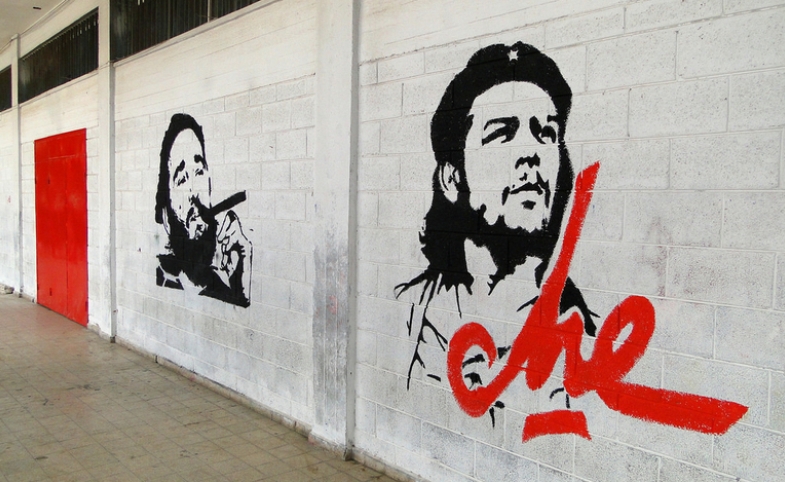Despite having turned into a Soviet subordinate and a repressive dictatorship at home, post-revolutionary Cuba is an excellent case study of a country that embarked in successful public diplomacy abroad. Cuba’s early soft...
KEEP READINGThe CPD Blog is intended to stimulate dialog among scholars and practitioners from around the world in the public diplomacy sphere. The opinions represented here are the authors' own and do not necessarily reflect CPD's views. For blogger guidelines, click here.

Leveraging Intellectuals for Soft Power
Cigars, Fidel Castro and Che Guevara. These are the three largest words shown in Cuba’s word cloud from the 2015-16 Country Brand Report. One year later, the island edges past Panama from eighth to seventh place in Latin America. This prompts the questions: where did Cuba’s mystique originate? How did Fidel and Che become such iconic world figures?
Part of the answer comes from Norberto Fuentes, an intellectual who since the 1960s has been chronicling the rise and fall of the Cuban Revolution. If public diplomacy revolves around credibility, as John Seiter and R.H. Gass suggest in the Routledge Handbook of Public Diplomacy, then Fuentes has been the state source for it since the beginning, documenting his country’s exploits against internal counterrevolutionaries as well as the forces led by Jonas Savimbi during the Angolan Civil War.
These were Cuba’s heroes, just like the Americans we were used to seeing on the endless World War II programming of The History Channel. Internationalism, people’s solidarity—these were some of the values then projected by the Cuban regime.
It was only after fleeing the island in 1994 that Fuentes changed course and began writing against the Cuban regime, beginning with his most popular work (translated into English), The Autobiography of Fidel Castro (2010), a fictional look at the maniacal strongman of Fuentes’ youth through the lens of a now disaffected member of Castro’s inner circle—Fuentes himself.
Yet my purpose here is not to dwell on a specific author, nor pitch the next novel for your commute. Instead, I would like to question how the United States is leveraging its own intellectuals as a part of soft power. Do we have individuals like Fuentes who popularize America for its virtues, values and contributions to the world? Or are we suffering as a country brand due to a poor cultural presence?
Former Cultural Affairs Officer (CAO) John Brown has written on this topic from his experience in the field. In his description of the 2010 Shanghai Expo—one of the landmark events for cultural diplomats—Brown notes an American guide from the U.S. pavilion who admitted that it “contains nothing about our history, our education system or our role in global affairs.”
I would like to question how the United States is leveraging its own intellectuals as a part of soft power. Do we have individuals like Fuentes who popularize America for its virtues, values and contributions to the world?
Instead, the pavilion streamed an eight-minute video of Kobe Bryant and Tony Hawk attempting to say “Welcome to the USA Pavilion” in Chinese. Adam Minter, a columnist for Bloomberg View, regretted that instead of witnessing “American ingenuity, creativity, and accomplishment, I saw a pavilion representing an America that spends too much time watching TV.”
Even now, as Fuentes writes critically of the Cuban regime, he is serving as a cultural ambassador for his country. That is because he follows a policy of honest public diplomacy, telling tales of the good and the bad, which are more crucial than ever in this age of media illiteracy and disinformation.
The fact is that no matter how much we train people to scrutinize the sources of their news, their perceptions about a country will ultimately rest upon the critical thinking they acquire as citizens. Literature helps develop that, and it is what Iranian author Azar Nafisi explains in her work The Republic of Imagination: America in Three Books (2014). Namely, a strong democracy needs its literature as a stamp of what it has lived so that it can realize what it intends to be.
“That is why the first targets of authoritarian societies,” Nafisi says in a 2015 interview with the Legatum Institute, “are usually women, minorities and culture, the three things that question the monopoly of voice.”
Nafisi’s opinion is seconded by another former diplomat, Charles Hill, who was a senior advisor to George Shultz and Henry Kissinger during the Cold War. Hill argues in Grand Strategies: Literature, Statecraft, and World Order (2010) that the free, interdisciplinary nature of literature is indispensable to the practice of diplomacy because—at the moment of making a decision—one must string together a plethora of data before knowing the truth behind all of the facts.
So, what are the top three words associated with the U.S. today? It is difficult to determine. The last Country Brand Report (2013) that even considered the U.S.’ cultural position ranked it 31st in history, 24th in art/culture and 20th in authenticity.
America is certainly not a “shopping mall,” as some would have it. We just need to ensure that foreign publics are reading works that are representative of our true culture. And that means putting our intellectuals in touch with them, whether they are supportive or critical of the country.
Photo by Adam Jones I CC BY-SA 2.0
Visit CPD's Online Library
Explore CPD's vast online database featuring the latest books, articles, speeches and information on international organizations dedicated to public diplomacy.
POPULAR ARTICLES
-
January 29
-
January 20
-
January 28
-
January 2
-
January 8
Join the Conversation
Interested in contributing to the CPD Blog? We welcome your posts. Read our guidelines and find out how you can submit blogs and photo essays >.













